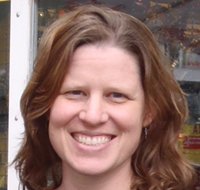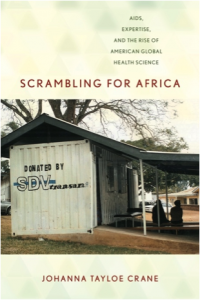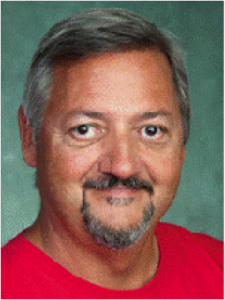Written by Natasha Simula, VFMP 2016
The 2nd Annual BC Global Health Student Forum was held in September this year at UBC’s Liu Institute for Global Issues. Two Professors that are very engaged in Global Health, Dr. Jeff Reading and Dr. Johanna Crane, attended as keynote speakers. The Global Health Dispatch had the privilege to talk to both of them.
 Dr Johanna Crane (MA, PhD) is a Medical Anthropologist at the School of Interdisciplinary Arts and Sciences at University of Washington-Bothell. She is both a professor and a researcher, with a focus on global health and the power dynamics that underlie global health research and practice. Her book “Scrambling for Africa: AIDS, Expertise and the Rise of the American Global Health Science” was published this year, and is the culmination of over 10 years of work in the United States and in Uganda.
Dr Johanna Crane (MA, PhD) is a Medical Anthropologist at the School of Interdisciplinary Arts and Sciences at University of Washington-Bothell. She is both a professor and a researcher, with a focus on global health and the power dynamics that underlie global health research and practice. Her book “Scrambling for Africa: AIDS, Expertise and the Rise of the American Global Health Science” was published this year, and is the culmination of over 10 years of work in the United States and in Uganda.
Dr. Crane has always been interested in understanding access to HIV treatment, first for homeless people in San Francisco, where she did her Master’s and PhD, and then in Uganda, in the town of Mbarara. When she started interviewing physicians in the Ugandan HIV clinic in the early 2000s, it was the only HIV clinic in all of Southwestern Uganda and was run out of an empty shipping container (seen on the cover of her book). Now, with international funding and the help of PEPFAR and the Global Fund, the clinic has expanded to serve thousands of patients a year and many more clinics have opened up to provide free access to HIV medications.

While Dr. Crane’s project started as a study on HIV treatment access in Uganda, she found herself in a great vantage point to observe the power dynamics that underlie global health research, and that is how the idea for her book started. With the exception of South Africa, most countries in Africa do not have enough money to invest in research, so African researchers often have to attach themselves to foreign research entities. This puts African research “into a backseat position in terms of setting the agenda because they have no direct access to grant money”, says Dr. Crane. With limited access to laboratory technology and staffing shortages, it can also be difficult for research in countries like Uganda to oblige to the protocols set by the US National Institute for Health, which may be funding the research. For these reasons, “global health isn’t actually global, poor countries don’t have much of a say”, and this needs to change. Dr. Crane’s advice for us Global Health enthusiasts is: “good intentions only get you so far. Always be self-critical. Always challenge yourself and your assumptions. Don’t assume that you understand what the problems or priorities are. Learn about the country’s goals and priorities before starting your work and always remember that you are there to learn as much as you can.“
 “I frame global health through an indigenous lens”, says Dr. Jeff Reading, a Professor at the School of Public Health and a research associate at the Centre for Aboriginal Health Research at the University of Victoria. His work focuses on understanding and improving the state of health of Aboriginal people. He will be part of the surveillance research on the First Nations Health Authority in BC, which just received authority over all Health Canada health programs and services to BC First Nations on October 21, 2013.Dr. Reading believes that the biggest challenge to Aboriginal health in Canada are the social determinants of health. “Until access to education, clean water and adequate housing, and the elimination of extreme poverty [in Aboriginal communities] are brought up to standard to other people in BC,” the First Nations community will continue suffering from health disparities. Another very important health determinant is the “multigenerational trauma that was brought on by the residential schools, which lead to a loss of cultural identity”, he says. Things are getting better though, as Dr. Reading has noticed a much greater representation of First Nations students and staff at University of Victoria today compared to 15 years ago: there are now 60 Aboriginal undergraduate students, 150 graduate students and 18 faculty members.
“I frame global health through an indigenous lens”, says Dr. Jeff Reading, a Professor at the School of Public Health and a research associate at the Centre for Aboriginal Health Research at the University of Victoria. His work focuses on understanding and improving the state of health of Aboriginal people. He will be part of the surveillance research on the First Nations Health Authority in BC, which just received authority over all Health Canada health programs and services to BC First Nations on October 21, 2013.Dr. Reading believes that the biggest challenge to Aboriginal health in Canada are the social determinants of health. “Until access to education, clean water and adequate housing, and the elimination of extreme poverty [in Aboriginal communities] are brought up to standard to other people in BC,” the First Nations community will continue suffering from health disparities. Another very important health determinant is the “multigenerational trauma that was brought on by the residential schools, which lead to a loss of cultural identity”, he says. Things are getting better though, as Dr. Reading has noticed a much greater representation of First Nations students and staff at University of Victoria today compared to 15 years ago: there are now 60 Aboriginal undergraduate students, 150 graduate students and 18 faculty members.
Dr. Reading’s global health work has taken him to Australia and New Zealand in efforts to spearhead more collaboration between Canada and Australia, and facilitate academic exchange between the two countries. The vision is for Australian health research students to spend time in a remote indigenous community or hospital in Canada doing locum positions and training, while Canadian students travel to the Australian Northern Territory for the same purpose. Aboriginal communities in Australia are in many ways similar to Aboriginal communities in Canada in terms of the health and access to health care issues that they face. Therefore, an exchange program would be extremely beneficial for students to not only learn about global health, but also to deepe their understanding of health in Canada.
Dr. Reading urges medical students to engage in the community and to participate in global health projects in indigenous communities in Canada and across the world. However, it is important to recognize that we are in their community and we should not try to impose a Western-based system. We need to adapt to the community and be respectful; as he says “we can bring something to the table with the knowledge we have, but it has to be delivered in an open-minded and respectful way.”
If you are interested in learning more about Dr. Reading’ s work, you can find an electronic copy of his book “The Crisis of Chronic Disease Among Aboriginal People: A Challenge for Public Health, Population and Social Policy” at the UBC library website.